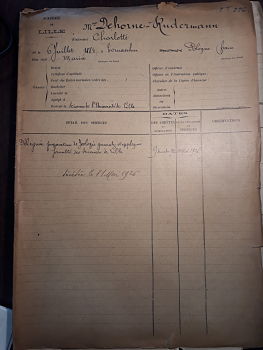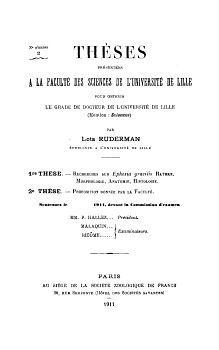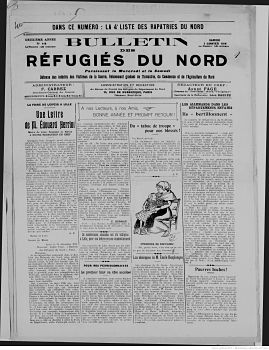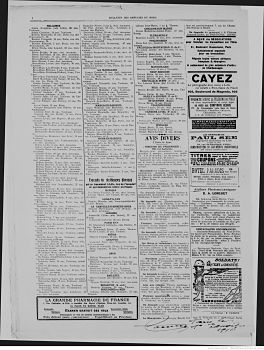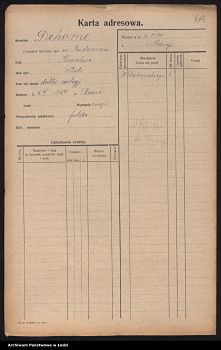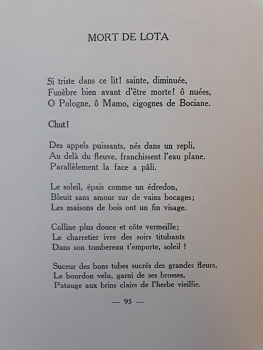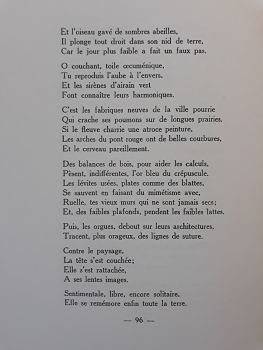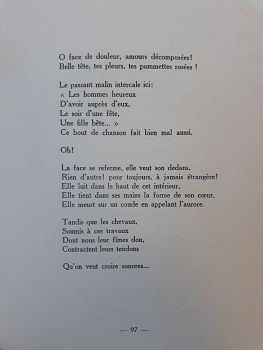
A Polish student at Lille’s Faculty of Science
Charlotte ‘Lota’[1] Ruderman was born on 6 July 1884 in Tomaszow Mazowiecki, in the Łódź region of Poland, which was at that time part of the Russian Empire. Her marriage certificate mentions her parents, Paul (or Piotr) Ruderman and Esther Galenska, but gives no indication of their professions or social background. Later documents tell us only that they were of the Jewish faith. However, we can imagine that her family belonged to the middle class or even the petit bourgeoisie, as she was one of the first waves of foreign students to come and study in France, often from Eastern Europe. Indeed, access to higher education was complicated for women in the Russian Empire at the end of the 19th century, all the more so for those of the Jewish faith, so many young women turned to French, German or Belgian universities.
As far as her classical education is concerned, we know that Charlotte Ruderman attended a girls’ gymnasium, the equivalent of the French lycées de jeunes filles (secondary school for those intending to study at university). In general, students who completed the full cycle of studies left these schools at the age of nineteen or twenty. We can therefore assume that she completed her secondary education around 1904.
It is difficult to find any trace of when the young woman arrived in France. According to her student record from the Lille Faculty of Science, she spent two years at the University of Liège between 1907 and 1909, where she obtained a Candidature en Sciences degree. This is the degree awarded on completion of the first undergraduate cycle of higher education at Belgian universities, in preparation for a doctorate in science. The first official record of Charlotte Ruderman’s attendance at the Lille Faculty of Science dates back to 1909, when her student file mentions enrolment for the 1909-1910 year. There, she studied for a certificate of higher education in zoology.
However, a book written by André Peragallo about his friend Armand Dehorne, Charlotte Ruderman’s future husband, and based on their discussions, tells us that she met him in Paris. Armand Dehorne, at that time a zoology ‘préparateur’ (lab assistant) at the Lille Faculty of Science, was working on his doctoral thesis at the University of Paris. Did their thesis and research topics bring them both to the capital? She was also working towards a doctorate, a degree often reserved for foreigners as it did not require them to have first obtained a bachelor’s degree. In any case, the two young people worked together every day, and this intellectual understanding led to a romantic affair.
Outside Paris, they carried out their research in maritime zoology at the Petit Port zoological laboratory in Le Portel, which was part of the Lille Faculty of Science and directed at the time by Professor Hallez. Finally, Charlotte Ruderman defended her thesis Research into ‘Ephesia gracilis’ Rathke: morphology, anatomy, histology on 22 July 1911. She was awarded the title of ‘Doctor’ by the University of Lille, with distinction, and became the Faculty’s very first female doctor. Armand Dehorne defended his own thesis Research into cell division: homeotypy and heterotypy in polychaete annelids and trematodes on 9 December 1911, and was awarded the degree of Doctor of Natural Sciences. Both dedicate their work to ‘Monsieur le Professeur A. Malaquin’, who had always been a great help to them in their research and professional life.
With their doctorates in hand, the two young doctors moved to Lille, where Armand Dehorne continued his work as a zoology ‘préparateur’ (lab assistant). They were married in Lille on 11 April 1912 in Lille, in the presence of the groom’s brother and friends. As Charlotte Ruderman was a foreigner and neither of her parents could be there in person to give their consent, a certificate of custom was issued by the Russian Consulate. Once married, the couple settled in La Madeleine, at 21 rue Docteur Legay. Together, they continued their studies in the field of biology, and in particular cell life.
Notes
[1] The nickname ‘Lota’ is used both professionally (she signs her work and a number of administrative documents under this name) and personally (she is referred to by this name by her husband).
[2] It should be noted that the various items of information contained on this census card are not necessarily the same as those held in the University archives. Thus, Charlotte is called ‘Karolina’ and was not born in Tomaszów Mazowiecki but in Rawa Mazowiecka.
[3] ‘Préparateurs’ helped professors with their teaching duties and were generally responsible for practical work sessions with students. From 1925 onwards, tenured ‘préparateurs’ took on the title of ‘assistants’, but retained the same functions.
War and its share of misfortunes
In 1914, war broke out and gradually disrupted the young couple’s daily routine. Charlotte Ruderman-Dehorne continued to prepare for her certificate of higher education in botany, which she was awarded with honours in July 1915. Armand Dehorne took part in the various campaigns against Germany, first as a sergeant and then as an auxiliary doctor in the infantry, before being posted to the IVth Army’s Bacteriology Laboratory as a sub-aide major from 2 April 1918 until his demobilisation in February 1919. For her part, Charlotte Ruderman-Dehorne was one of thousands evacuated from Lille and the surrounding area by the Germans. Sources for this period of her life are incomplete, but she certainly followed the route established to repatriate French nationals from the North of France to Free France: via the Swiss border town of Schaffhausen, then Geneva. From this, we know that she appears on the lists of French civilian repatriates, and that she passed through Geneva on 18 December 1915. This list tells us that the destination to which she was redirected was Toulouse. She probably passed through Annemasse, the main repatriation hub until January 1917.
However, as early as January 1916, the Bulletin des réfugiés du département du Nord (Nored Department Refugees’ Report) announced her arrival in Paris, where she stayed at 100 boulevard Magenta. We have no precise date for her return to Lille, but she was reunited with her husband in February 1919, and the two resumed their daily lives in a city ravaged by war. Thanks to André Peragallo’s book, we learn that 1919, while synonymous with the couple’s reunion, also brought its share of misfortunes. Armand Dehorne lost two of his sisters, Yvonne and Christiane, to the Spanish flu epidemic in Paris. Charlotte Ruderman-Dehorne became pregnant, but complications led to the premature death of their child, probably in late 1919 or early 1920. She recovered from this ordeal with great difficulty and was left weakened.
In his book, André Peragallo recounts how the couple travelled to many countries, including Poland, Germany, Austria and Switzerland. Some of these trips also enabled Charlotte Ruderman-Dehorne to visit her family back in Poland. In the summer of 1920, she visited her mother, Esther Galenska-Ruderman, who was still living in her native Łódź. According tothe census map of the time, his widowed mother lived on General Henryka Dabrowskiego Square, right next to the large theatre in Łódź[2]. So she kept in touch with her family even though she stayed in France.
Resuming her studies and her career as a zoology ‘préparateur’ (lab assistant)
At the start of the 1920 academic year, she enrolled again at the Faculty of Science to resume her studies, which had been interrupted by the conflict, and in particular to work towards a certificate of higher education in geology.Alongside her studies, she was recommended by Professor Alphonse Malaquin in December 1920 for the post of deputy ‘préparateur’ (lab assistant)[3] for general and applied zoology, becoming the first female zoology ‘préparateur’. In June 1921, she obtained her certificate of higher education in geology, which enabled her to obtain a Bachelor of Science degree in July 1921. Thanks to this degree, she was appointed to her position as ‘préparateur’ on 1 July 1921, thanks in particular to the support of Professor Alphonse Malaquin and Dean Benoît Damien. She worked alongside her husband and was described as an excellent collaborator by her colleagues. However, her health had not improved since the loss of her child and, by 1922, she had to take several months off work to combat what appeared to be blood cancer.
Despite all the care she received, Charlotte Ruderman-Dehorne finally succumbed to her illness and died on 11 May 1926 at their family home, 45 rue Louis Faure in Lille. For her husband, the loss would remain deep and painful. In addition to his career as a biologist, Armand Dehorne was also a poet; he took refuge in poetry and composed a moving text in honour of his lost love:
Charlotte Ruderman-Dehorne left her mark on Lille’s Faculty of Science. Arriving as a foreign student, she became the first woman to successfully defend a university doctoral thesis and hold the position of zoology ‘préparateur’ (lab assistant).
Notes written by Marie Lefèvre.
Bibliography
Dehorne Armand, Hard Labour Trilogie : vol. 01 Nord, Lille : Mercure de Flandre, 1929.
Dhainaut André and Marcel Roger, Histoire de la Faculté des Sciences de Lille et de l’Université des Sciences et Technologies de Lille, Vol. 2: Le Laboratoire de Zoologie (1854 - 1970), Association de Solidarité des Anciens Personnels de l’Université de Lille, p. 27 asap.univ-lille.fr/ASAP/publications/Tome2_zoologie.pdf
Peragallo André, Armand Dehorne: poète du Nord, 1882-1974, Paris: Barre-Dayez, ‘Jalons’, 1984, p. 274
Schmitt François, ‘Les deux laboratoires de zoologie maritime du Portel de 1888 à 1942’, Le Portel Notes et Documents, no. 31, 2012, pp. 91-103.
Schmitt François, ‘Les laboratoires zoologiques, maritimes et océanologiques du Boulonnais, 1874-2014’, Mémoire d’Opale, no. 6, 2014, pp. 34-43.
Sources
Nord Department Archives
Register of graduates of the Lille Faculty of Science – 3268W81 and 3268W82
Archives concerning Charlotte Ruderman-Dehorne:
Lille Faculty of Science student file – 3239W26
Rectorate personnel file – 2T226
Lille Faculty of Science personnel file – 3631W18
Archives concerning Armand Dehorne:
Lille Faculty of Science student file – 3239W26
Rectorate personnel file – 2T226
Lille Faculty of Science personnel file – 3631W18
Marriage certificate – 3E15252
Death certificate – 3E15452
Lille University Library
University of Lille Annals: Annual report of the University Council, Minutes of the Deans of the Faculties, 1909-1965, available online at nordnum.univ-lille.fr/ark:/72505/a011478698385yctcuu
Łódź State Archives
Łódź city files, population registers, census files - 39/221/0 / 4.12 / 24536
gallica.bnf.fr/National Library of France
Digitised press and magazines: Bulletin des réfugiés du Nord, 1 January 1916 issue, gallica.bnf.fr/ark:/12148/bpt6k62951929

